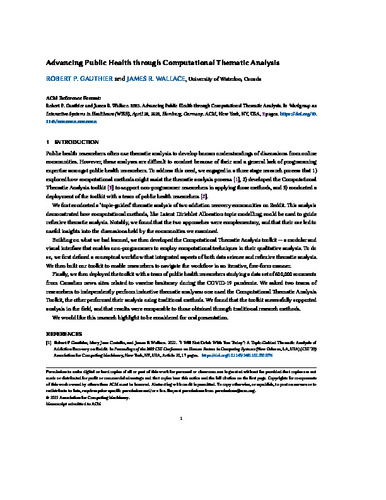| dc.contributor.author | Gauthier, Robert P. | |
| dc.contributor.author | Wallace, James | |
| dc.date.accessioned | 2024-04-05 13:38:26 (GMT) | |
| dc.date.available | 2024-04-05 13:38:26 (GMT) | |
| dc.date.issued | 2023-04-28 | |
| dc.identifier.uri | http://hdl.handle.net/10012/20421 | |
| dc.description.abstract | Public health researchers often use thematic analysis to develop human understandings of discussions from online communities. However, these analyses are difficult to conduct because of their and a general lack of programming expertise amongst public health researchers. To address this need, we engaged in a three stage research process that 1) explored how computational methods might assist the thematic analysis process \cite{gauthier2022will}, 2) developed the Computational Thematic Analysis toolkit \cite{gauthier2022computational} to support non-programmer researchers in applying those methods, and 3) conducted a deployment of the toolkit with a team of public health researchers \cite{gauthier2023agency}.
We first conducted a `topic-guided' thematic analysis of two addiction recovery communities on Reddit. This analysis demonstrated how computational methods, like Latent Dirichlet Allocation topic modelling, could be used to guide reflexive thematic analysis. Notably, we found that the two approaches were complementary, and that their use led to useful insights into the discussions held by the communities we examined.
Building on what we had learned, we then developed the Computational Thematic Analysis toolkit --- a modular and visual interface that enables non-programmers to employ computational techniques in their qualitative analysis. To do so, we first defined a conceptual workflow that integrated aspects of both data science and reflexive thematic analysis. We then built our toolkit to enable researchers to navigate the workflow in an iterative, free-form manner.
Finally, we then deployed the toolkit with a team of public health researchers studying a data set of 600,000 comments from Canadian news sites related to vaccine hesitancy during the COVID-19 pandemic. We asked two teams of researchers to independently perform inductive thematic analyses: one used the Computational Thematic Analysis Toolkit, the other performed their analysis using traditional methods. We found that the toolkit successfully supported analysis in the field, and that results were comparable to those obtained through traditional research methods. | en |
| dc.language.iso | en | en |
| dc.publisher | Association for Computing Machinery (ACM) | en |
| dc.relation.ispartofseries | Workgroup on Interactive Systems in Healthcare (WISH); | |
| dc.rights | Attribution 4.0 International | * |
| dc.rights.uri | http://creativecommons.org/licenses/by/4.0/ | * |
| dc.subject | thematic analysis | en |
| dc.subject | machine learning | en |
| dc.subject | computational social science | en |
| dc.subject | health | en |
| dc.title | Advancing Public Health through Computational Thematic Analysi | en |
| dc.type | Extended Abstract | en |
| dcterms.bibliographicCitation | Gauthier, R.P. & Wallace, J.R. (2023). Advancing Public Health through Computational Thematic Analysis. Workgroup on Interactive Systems in Healthcare (WISH). Hamburg, Germany. | en |
| uws.contributor.affiliation1 | Faculty of Health | en |
| uws.contributor.affiliation2 | School of Public Health Sciences | en |
| uws.typeOfResource | Text | en |
| uws.peerReviewStatus | Unreviewed | en |
| uws.scholarLevel | Faculty | en |


